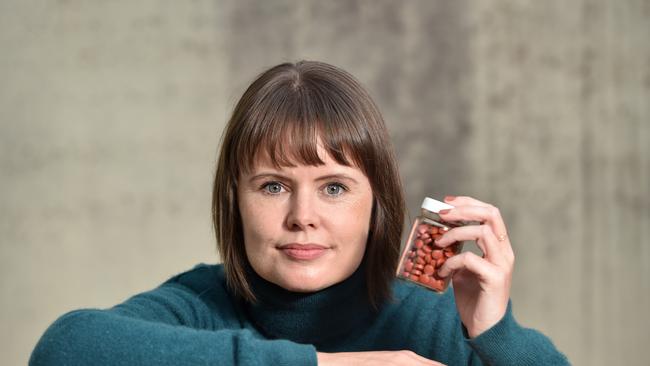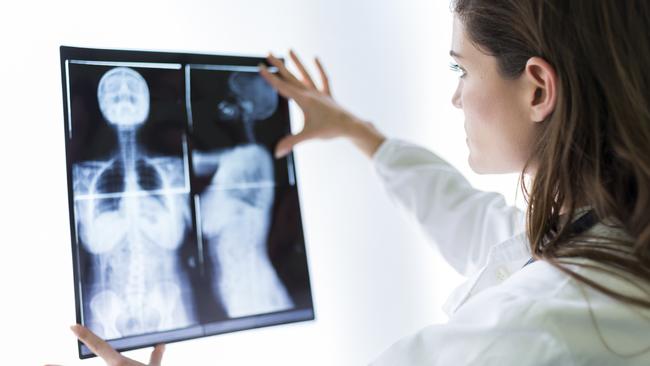Fresh hope for women who carry BRCA cancer genes
Taking a common anti-inflammatory drug daily could extend the window for women with the cancer genes made famous by actress Angelina Jolie.

Victoria
Don't miss out on the headlines from Victoria. Followed categories will be added to My News.
A daily dose of aspirin may be a key to preventing an aggressive form of cancer and extending the window for women to have children despite carrying the BRCA ‘cancer genes’.
Australian hospitals including the Peter MacCallum Cancer Centre and Royal Women’s Hospital have begun a trial to determine if at-risk women can protect themselves from incurable abdominal cancers by taking the anti-inflammatory before undergoing pre-emptive surgery to have their reproductive organs removed.
Doctors leading the international trial have urged women carrying the BRCA1 or BRCA2 not to begin taking aspirin as a preventive measure until they have determined its effectiveness, but are hopeful it will give them a new weapon against abdominal cancers with few side effects.

The Peter Mac’s Professor Kelly-Anne Phillips said the common anti-inflammatory drug was hoped to overcome a condition called serous tubal intraepithelial carcinoma – or STIC – which was this year linked to abdominal cancers in BRCA-positive women.
About 1000 Australian women a year undergo pre-emptive surgery to avoid ovarian cancers, however one in 10 then face a high chance of developing abdominal cancer within a decade because they had STIC present at the time of their operations.
“If you can reduce the chance of having a STIC at the time of your surgery – and maybe you can do it with this common anti-inflammatory agent – then you don’t have to worry too much about getting a subsequent abdominal cancer,” Prof Phillips said.
“I don’t think it’s going to replace having tubes and ovaries out because that’s always going to be more effective than a medication.
“But we often see women that have been newly diagnosed with mutations in these genes who are in their late 30s and haven’t completed their child-bearing and don’t want to have their tubes and ovaries out yet.
“If this trial is positive we’ll have this anti-inflammatory medication in our toolkit as something additional we can use to delay a little longer the time before we do that surgery.”
Results of Dutch research published in the Journal of Clinical Oncology in March revealed that women who had STIC present at the time of their surgery faced a 30 per cent chance of developing abdominal cancer in the next decade, compared to less than 1 per cent among those without the condition.

As a result, the Canadian cancer Trials Group-led STICs & STONEs trial has begun seeing 414 women with the BRCA mutation taking either a daily dose of aspirin or a placebo for six to 24 months before undergoing their pre-emptive surgeries a the Melbourne hospitals, or at others in Sydney, Perth or Canada.
“If our hypothesis is correct - that this drug reduces the chance of getting STIC - then we expect to see fewer STICs in the women who got the anti-inflammatory drug versus other women who got placebo,” Prof Phillips said.
“Our hypothesis is around inflammation associated with ovulation being a starting point for some of the cancers, so it makes sense that an anti-inflammatory drug might be helpful.
The international hypothesis is supported by previous observational studies that have indicated women who take aspirin regularly for other reasons have lower rates of ovarian cancers.
Fitzroy’s Bonney Corbin, 39, is one of 30 Australian women who have already taken daily pills in the lead up to her pre-emptive surgery as part of the trial.
“I’m BRCA1 positive and I’ve lost a number of family members to cancer over the years. I’m now the oldest person in my bloodline with these mutations, so I’m looking at alternatives to extend my quality and quantity of life,” she said.
“I chose to have this surgery, particularly a hysterectomy because it’s the most effective option for my personal situation at this time – but I really refuse to believe that sterilisation should be the best method of gynaecological cancer prevention.
“I look at younger children in my family and I just want them to have a very different future to the choices that I’ve had.”
Women interested in taking part can call 1800 111 581, or email stics.study@sydney.edu.au




